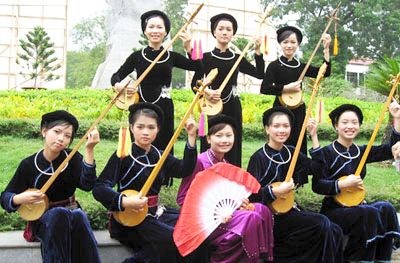Plan to build dossier for Then singing adopted
The Ministry of Culture, Sports and Tourism announced on August 18 that it has approved a plan to compose a dossier seeking UNESCO recognition of Then singing of the Tay, Nung and Thai ethic groups as an intangible cultural heritage of humanity.
 |
| A Then singing troupe. Photo: vietnamtourism.com.vn |
The Viet Nam National Academy of Music in conjunction with localities where Then singing is prevalent such as Tuyen Quang, Bac Kan, Bac Giang, Cao Bang, Dien Bien, Ha Giang, Lai Chau, Lang Son, Lao Cai, Quang Ninh, Thai Nguyen and Yen Bai will carry out the compilation of the dossier.
The academy is responsible for the dossier’s scientific contents while the Tay, Nung and Thai ethnic communities along with the People’s Committees, Departments of Culture, Sports and Tourism, and Departments of Cultural Heritage of relevant provinces as well as the Viet Nam Folk Arts Association will participate in building the dossier – which should be finalised by February 28, 2016.
The dossier compilation for national nomination and then submission to UNESCO aims to honour and promote the heritage value of the traditional music genre to international friends as well as help local communities, especially the youth, gain awareness of and raise the sense of responsibility for preserving the heritage values.
It also promotes cultural exchanges between the Tay, Nung and Thai people and other ethnic groups in Viet Nam and other countries where musical genres similar to Then singing is practised.
Then singing is a unique combination of music and song and traditionally accompanied by a handmade gourd lute, called “Dan Tinh” or “Tinh Tau”.
It is believed to have been handed down from their God, belonging to a mysterious world to which only “Ong Then” and “Ba Then” can contact.
During rituals, “Ong Then” and “Ba Then” sing and play a musical instrument at the same time while presenting offerings to God, representing the ethnic community’s contact with God and asking him for things such as good health, bumper crops, happiness and a long life.
Closely linked with the spiritual life of ethnic minority groups who often use ceremonial offerings to treat illnesses, Then singing is seen as therapy together with medicine, helping to ease the worries of patients and their families.
(Source: VNA)




